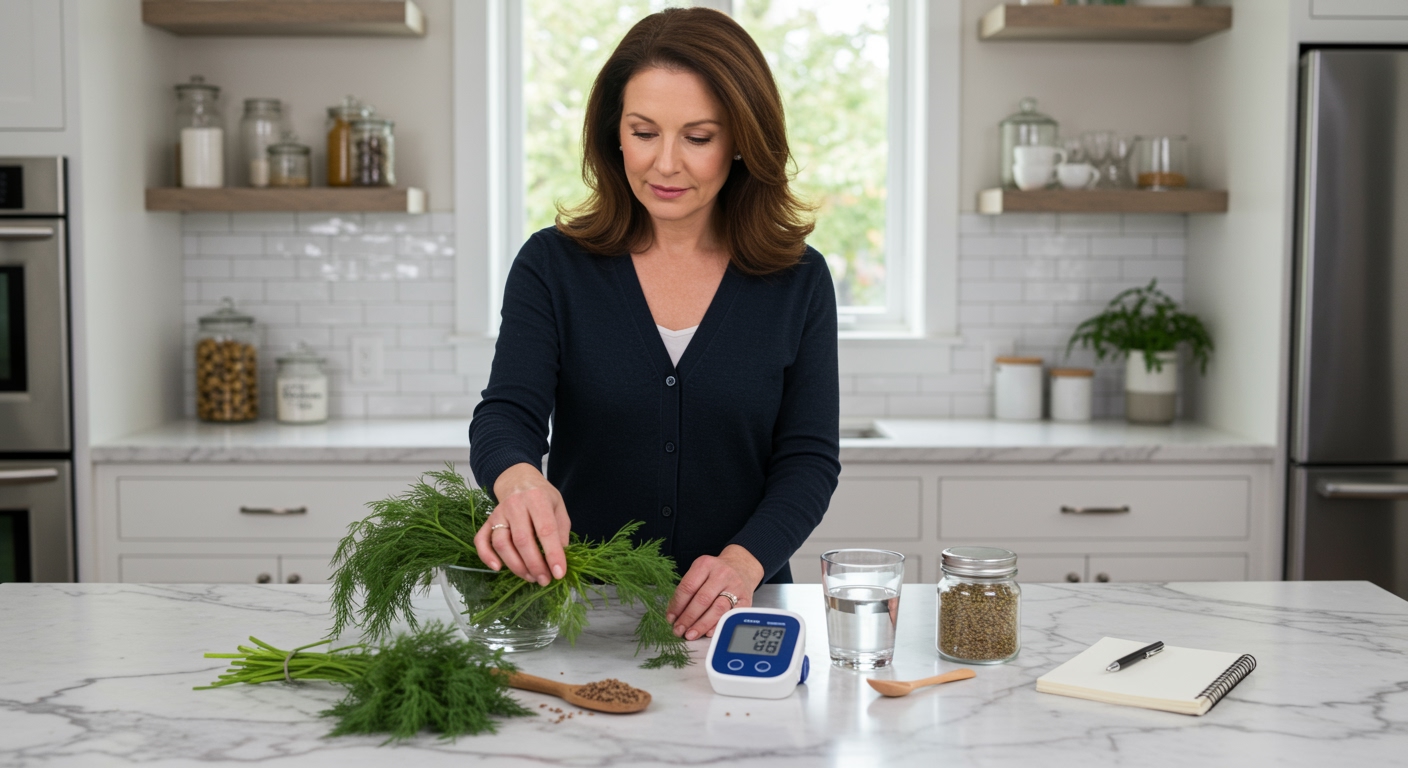✪ Key Takeaway: Hypotension patients should use dill cautiously as it may further lower blood pressure through its diuretic effects.
Introduction
Your doctor just told you that your blood pressure is too low, and now you are questioning everything in your kitchen cabinet.
You might be wondering if that fresh dill you love adding to your salads and soups could be making your hypotension worse.
Hi, I am Abdur, your nutrition coach, and today I am going to explain whether dill poses real risks for people with low blood pressure and what you need to know to make informed decisions.
What Does Dill Actually Do To Your Blood Pressure?
Dill contains compounds that can influence your cardiovascular system in ways you might not expect.
The herb contains flavonoids and essential oils that have mild diuretic properties, meaning they can increase urine production and potentially reduce blood volume.
When your blood volume decreases, your blood pressure naturally drops because there is less fluid pushing against your artery walls.
Research shows that dill extract can cause a modest reduction in both systolic and diastolic blood pressure in some individuals.
For people with normal or high blood pressure, this effect might be beneficial, but for hypotension patients, it could worsen their condition.
The mechanism works through dill’s ability to relax blood vessels and promote sodium excretion through the kidneys.
✪ Fact: Dill contains over 60 different compounds that can affect your cardiovascular system.
How Much Dill Is Too Much For Hypotension?
The amount of dill that could affect your blood pressure depends on several factors including your current blood pressure levels and overall health status.
Small amounts used as a culinary herb – like a teaspoon of fresh dill on your salmon or in a salad – are unlikely to cause significant blood pressure changes.
However, consuming large quantities or taking dill in concentrated forms like extracts or supplements could pose problems.
Most nutrition experts suggest that hypotension patients should limit fresh dill to no more than one tablespoon per day.
Dried dill is more concentrated than fresh, so you should use even smaller amounts – perhaps half a teaspoon daily.
The key is monitoring how you feel after consuming dill and watching for symptoms like dizziness, fatigue, or lightheadedness.
✪ Pro Tip: Start with tiny amounts and gradually increase while monitoring your symptoms.
What Are The Warning Signs To Watch For?
Your body will give you clear signals if dill is affecting your blood pressure negatively.
The most common warning sign is increased dizziness, especially when you stand up quickly from sitting or lying down.
You might also experience more frequent episodes of fatigue or feeling weak without any obvious reason.
Some people notice their heart rate becomes more irregular or they feel their heart pounding more than usual.
Nausea and headaches can also occur when your blood pressure drops too low after consuming herbs like dill.
If you experience any of these symptoms within a few hours of eating dill, you should reduce or eliminate it from your diet temporarily.
Keep a food diary to track when you consume dill and any symptoms that follow – this will help you identify patterns.
✪ Note: Symptoms typically appear within 2-4 hours of consuming dill in significant amounts.
Are There Safe Ways To Enjoy Dill With Low Blood Pressure?
You do not have to completely eliminate dill from your diet if you have hypotension, but you need to be strategic about how you use it.
Timing matters – avoid consuming dill on an empty stomach or when you are already feeling weak or dizzy.
Pair dill with foods that can help stabilize your blood pressure, such as foods high in sodium or those rich in natural sugars.
Consider using dill as a garnish rather than a main ingredient – sprinkle small amounts on finished dishes instead of cooking with large quantities.
Stay well-hydrated when consuming dill, as proper hydration helps maintain blood volume and can counteract some of its diuretic effects.
Always eat dill with a balanced meal rather than on its own, and avoid dill supplements or concentrated extracts entirely.
If you take medications for hypotension, discuss dill consumption with your healthcare provider to avoid any potential interactions.
✪ Pro Tip: Combine dill with salty foods to help counteract its blood pressure lowering effects.
The Bottom Line
Hypotension patients should approach dill with caution but do not need to avoid it completely if used mindfully and in small amounts.
Smart nutrition is about understanding how foods affect your unique body, not following blanket rules that ignore your individual health needs.
I would love to hear about your experiences with herbs and low blood pressure – share your questions or thoughts in the comments below so we can learn from each other.
References
At NutritionCrown, we use quality and credible sources to ensure our content is accurate and trustworthy. Below are the sources referenced in creating this article:
- PMC: Dill (Anethum graveolens L.) and its bioactive compounds
- Cleveland Clinic: Low Blood Pressure (Hypotension)
- Mayo Clinic: Low blood pressure (hypotension) – Symptoms and causes
- Healthline: Dill: Nutrients, Benefits, and Uses





